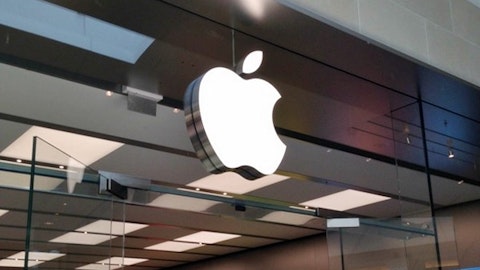Billionaire Julian Robertson is a hedge fund legend and his opinion is highly valued on the Street, which is one of the reasons why we follow Tiger Management and analyze its equity portfolio every quarter alongside more than 700 other hedge funds. Mr. Robertson recently participated in an interview on Fox Business Network, where he discussed the current market situation, presented his outlook, and mentioned some of the stocks that he likes. Meanwhile, we have taken a look at the performance of Mr. Robertson’s equity portfolio during the first three months of 2015, focusing on his 45 stocks with a market cap of over $1.0 billion. These stocks had a modest weighted average return of 1.9% during the first quarter, although they outperformed the S&P 500 ETF (SPY), which inched up by 0.9% during the same period.

On the other hand, during the same three months of 2015, our small-cap strategy had even stronger returns, gaining 5.5%. The strategy is focused on imitating the 15 most popular small-cap picks among the funds from our database. Over the last 2.5 years this strategy provided cumulative returns of 132%, versus the SPY’s appreciation of slightly above 50% (see more details why we track hedge funds). The main reason why this strategy works is the fact that small-cap picks are less efficiently priced in comparison with mid- and large-cap stocks, even though most investors prefer to invest in the latter group of companies. However, our backtests showed that an equally-weighted portfolio of the 50 most popular stocks among hedge funds, which are primarily large- and mega-cap companies, underperformed the market by an average of 7.0 basis points between 1999 and 2012.
One of the main questions that Mr. Robertson answered during his interview with FBN’s Maria Bartiromo was regarding the current market situation and specifically whether he sees the current market as a bubble. Mr. Robertson said that he is concerned about the “twin bubbles”, which are created by central banks across the countries. Through low bond yields, governments create “bond bubbles”, which make it difficult to save money and easy to borrow, which is “conducive to long-term prosperity.” The investor also added that he expects the Fed to raise interest rates this year, because “the economy wants it”. Regarding the dollar, Mr. Robertson said he believes the currency will become stronger, mainly because Europe “needs a strong dollar and they are going to do their best to cut the value of their currency”.
Aside from the bond bubble, the manager of Tiger Management also mentioned the biotech bubble, adding that there is still some value in some of those companies. One of the biotech stocks that Mr. Robertson likes is Gilead Sciences, Inc. (NASDAQ:GILD), in which Tiger Management owns 533,900 shares according to its latest 13F. The position, valued at $50.33 million was the second-largest in the investor’s equity portfolio at the end of 2014. The stock of Gilead Sciences, Inc. (NASDAQ:GILD) advanced by 4.11% during the first three months of 2015, but it has doubled since the middle of 2013, when Tiger first initiated a stake in the company. Gilead Sciences, Inc. (NASDAQ:GILD) was in fact the most popular biotech stock among the funds that we track, with 97 investors disclosing long positions, including 12 billionaires including Israel Englander, David Shaw, and Steven Cohen.
In addition, Mr. Robertson said that he likes the “great growth companies,” such as Google Inc (NASDAQ:GOOGL) and Apple Inc. (NASDAQ:AAPL). He added that Google Inc (NASDAQ:GOOGL) and some other companies have a product line that can ensure growth for a long period. In its latest 13F filing, Tiger Management disclosed holding some 25,000 shares of Google Inc (NASDAQ:GOOGL)’s Class A stock and 40,600 shares of Google’s Class C stock, up by 25,900 shares on the quarter. In Apple, Tiger owns 321,900 shares as of the end of December, the stake being increased by 306,000 shares during the fourth quarter. Both positions aided Tiger Management’s returns during the first quarter, with Apple Inc. (NASDAQ:AAPL)’s stock jumping by more than 13%, while both Google Inc (NASDAQ:GOOGL)’s Class A and Class C stocks appreciated by more than 4%. Mr. Robertson said that if Apple and Google’s stocks had the 1970’s and 1980’s multiples, they would be double and triple the current prices. Among the investors that we track, another billionaire that is bullish on both companies is Ken Fisher of Fisher Asset Management, who owns 10.76 million shares of Apple Inc. (NASDAQ:AAPL) and 597,900 and 794,300 shares of Google Inc (NASDAQ:GOOGL)’s class C and Class A shares respectively.
The investor also added that he would put Facebook Inc (NASDAQ:FB) rather than Twitter Inc (NYSE:TWTR) in the category of growth companies. Mr. Robertson owns 317,500 shares of Facebook Inc (NASDAQ:FB), the position being initiated over a year ago. However, when we compare the returns of both stocks over the first three months of 2015, there is a huge difference, with Facebook’s stock inching up by 5.38%, while Twitter Inc (NYSE:TWTR) surged by almost 40% during the same period. The majority of funds that we track are on Mr. Robertson’s side however, with Facebook Inc (NASDAQ:FB) ranking on the sixth spot with 118 funds with long positions, while Twitter Inc (NYSE:TWTR) is much lower, with only 42 investors holding shares of the company.
However, Mr. Robertson believes that with the Fed raising interest rates this year, there should be a sell-off in the market, so he is protecting himself by going short. One of the companies that Mr. Robertson thinks is “interesting” is Amazon.com, Inc. (NASDAQ:AMZN), because it has had huge growth and captured the attention of investors, even though it doesn’t have any cash flow. Nevertheless, Mr. Robertson is short Amazon.com, Inc. (NASDAQ:AMZN), and Tiger’s latest 13F filing disclosed ownership of ‘Put’ options underlying 160,000 shares of the internet retailer. However, the $173 billion company was one of the top gainers among companies with a market cap of over $100 billion, jumping by almost 20% in the first three months mainly on the back of strong financial results for the fourth quarter. Ken Fisher, Boykin Curry, Ken Griffin, and David Shaw are only a few of the 76 investors with long positions in Amazon.com, Inc. (NASDAQ:AMZN), although Messrs. Griffin and Shaw also own ‘Put’ and ‘Call’ options underlying shares of the company.
Disclosure: None





